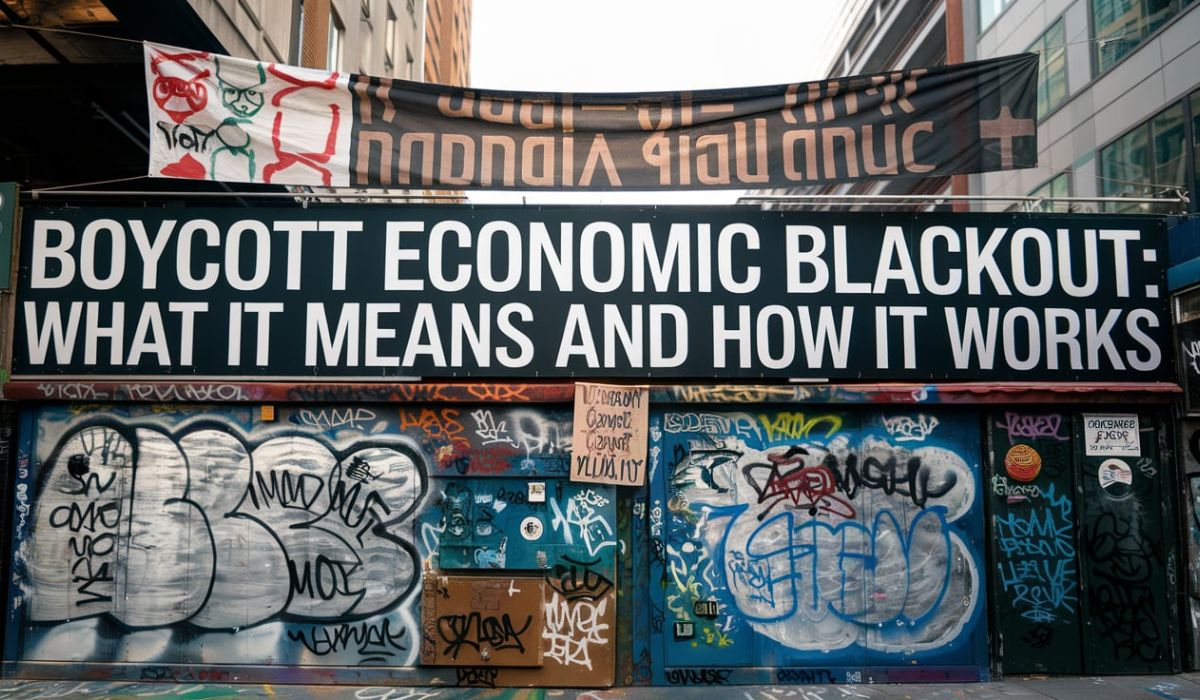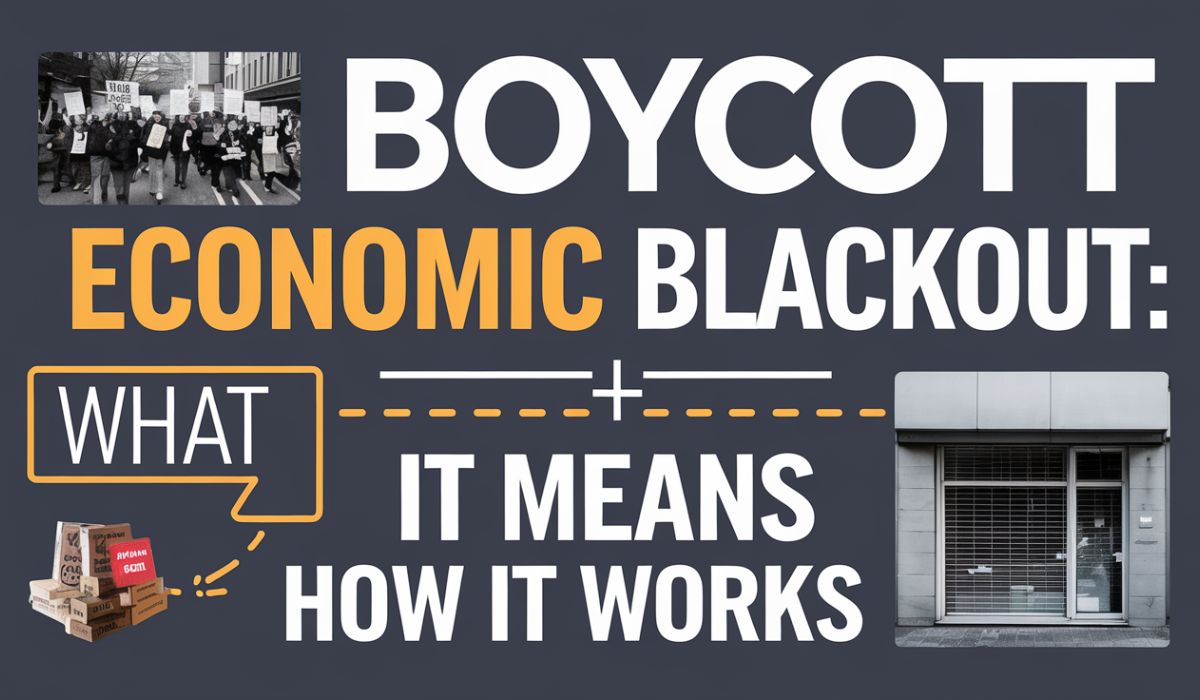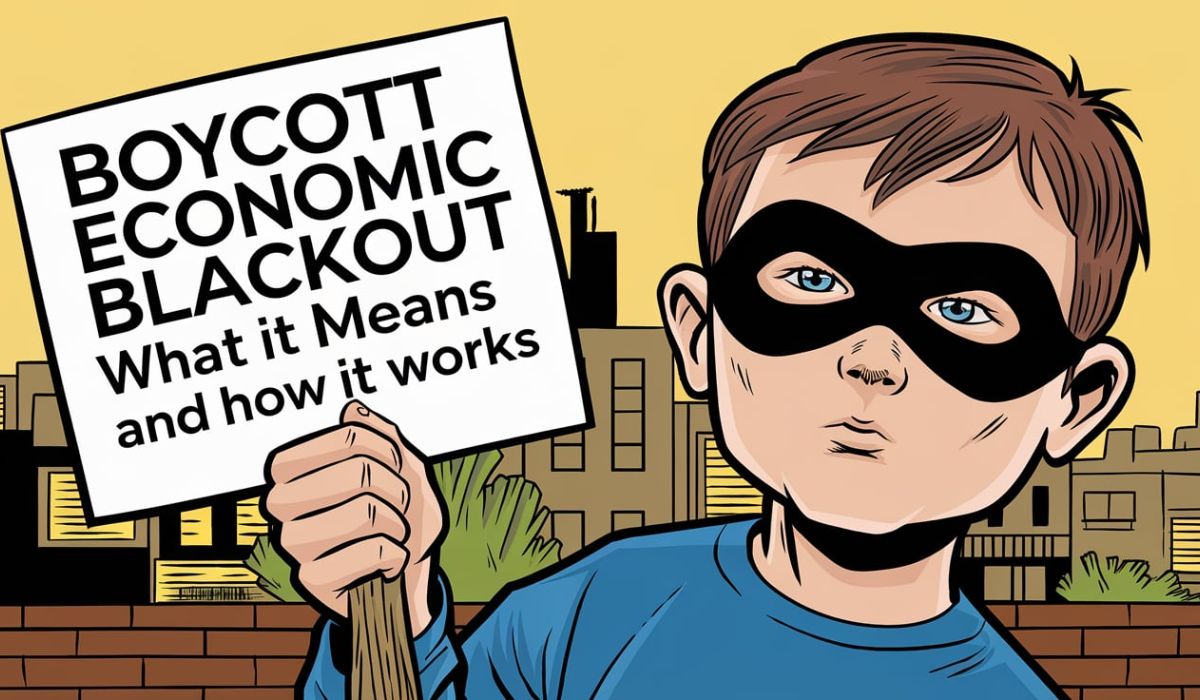In a world increasingly driven by economic interdependence, the idea of a boycott economic blackout may seem a little extreme. But in reality, such actions are an essential tool for activists, governments, and businesses alike. So, what exactly is this economic strategy? How can it be used to influence change, and what are the potential consequences for the people involved?
Whether you’re a consumer curious about the power of your purchasing decisions or someone who wants to understand the impact of large-scale economic actions, this article will break down the boycott economic blackout in a simple, accessible way. Let’s dive into this intriguing and impactful concept, exploring how it works, why it’s used, and what results it can produce.
What is a Boycott Economic Blackout?

A boycott economic blackout is essentially an organized attempt to disrupt or limit economic activity within a specific sector, company, or country in response to a perceived injustice or unethical practice. It often involves consumers refusing to purchase products, services, or engage in financial transactions that would benefit the target entity.
It’s like a blackout in the sense that it cuts off the “light” or flow of money that fuels an organization. When enough people participate, the impact can be significant, pressuring the organization or government to change its behavior or policies.
Historical Examples of Economic Blackouts
History is full of examples where economic blackouts have been used to protest policies, corporate behavior, or social issues. One of the most famous examples is the Montgomery Bus Boycott in 1955-1956. In response to racial segregation laws, African Americans in Montgomery, Alabama, refused to use the city’s buses. This economic pressure played a crucial role in ending segregation on public buses and was a major turning point in the Civil Rights Movement.
Another example is the anti-apartheid boycott of South Africa. During the 1980s, countries, organizations, and individuals refused to engage in economic activity with South Africa due to its racist policies. The boycott was a significant factor in putting pressure on the South African government to dismantle apartheid.
How Does a Boycott Economic Blackout Work?
At its core, a boycott economic blackout relies on a simple idea: reduce or eliminate the economic support to a particular entity. But to be effective, this needs to be organized and strategic.
-
Target Identification: The first step is identifying the company, product, or entity to target. This could be a corporation that engages in unethical practices, a government that implements oppressive policies, or a country that violates human rights.
-
Mobilization: People who share the same concerns begin spreading the word. With modern communication tools like social media, organizing a boycott has become easier than ever before. Activists can reach millions of people in a matter of hours.
-
Participation: For a boycott economic blackout to have impact, it must attract a significant number of participants. This mass movement weakens the target economically, forcing them to reconsider their actions.
-
Pressure for Change: As the targeted entity begins to feel the financial strain, it may eventually feel compelled to change its policies, behaviors, or strategies in order to restore its income or avoid further damage.
The Power of Consumer Activism in Economic Blackouts

Consumer activism is one of the most powerful tools behind economic blackouts. When consumers choose not to buy a product or service, they are sending a direct message to businesses and governments. It’s a simple form of protest that hits hard, especially in a world where the economy thrives on consumer spending.
By boycotting a product or service, consumers are not just affecting the financial bottom line of a company. They are influencing public opinion, social norms, and sometimes even legislation. Boycott economic blackouts allow individuals to come together to make a collective impact and hold businesses accountable for their actions.
How Do Governments and Businesses React?
Governments and businesses are highly attuned to the economic impact of boycott economic blackouts. When large numbers of consumers stop purchasing goods or services, businesses may see a drop in revenue. In response, they often reevaluate their practices, especially if they fear a long-term loss of customers.
Governments, especially those that rely on international trade or tourism, may also be forced to reconsider their policies if they face widespread economic boycotts. For example, if a country is boycotted by other nations due to human rights violations, its government may come under pressure to address these issues to restore economic relationships.
What Are the Benefits of a Boycott Economic Blackout?
-
Increased Awareness: Boycotts often draw attention to specific issues, such as environmental concerns, worker rights, or political oppression.
-
Economic Pressure: By withholding funds, boycotts can have a significant financial impact, making companies or governments reconsider their practices.
-
Empowerment: Boycotts provide individuals with a sense of empowerment, as they feel they are contributing to a greater cause and making a tangible difference.
-
Global Solidarity: Boycotts often bring together people from various backgrounds, united by a common cause, showing that collective action can lead to change.
The Potential Drawbacks of Boycotts

While boycott economic blackouts can be highly effective, they are not without their challenges. Not all boycotts lead to the desired results, and sometimes they may even backfire.
-
Economic Impact on Workers: Sometimes, the very workers who are being protested against are the ones who suffer the most when a company loses revenue due to a boycott. This can lead to layoffs or wage cuts.
-
Effectiveness: Not all boycotts achieve their intended goals. Some organizations or governments may simply ignore the protests, especially if they are not significantly affected by the loss of consumer support.
Can a Boycott Economic Blackout Change Corporate Behavior?
Yes, a boycott economic blackout can influence corporate behavior, but it depends on several factors. The size and scope of the boycott, the target’s vulnerability to financial pressure, and the media attention generated can all play a role in determining whether the boycott results in change.
For example, a boycott economic blackout against a corporation that relies heavily on consumer spending (like a major retailer) is likely to have a more immediate effect than one aimed at a less consumer-dependent company.
Global Impact of Economic Blackouts
Boycotts are not just local events—they can have global consequences. The power of a boycott can stretch across borders, affecting international trade and diplomacy. A boycott economic blackout can influence global supply chains, lead to diplomatic tensions, and even spark other forms of protest or solidarity movements.
Social Media’s Role in Fueling Economic Blackouts
In today’s digital age, social media has become a powerful tool for organizing and spreading boycott campaigns. A viral hashtag or an influential figure endorsing a boycott can quickly turn a small movement into a global phenomenon.
Social media allows activists to reach a larger audience and mobilize people from different parts of the world to take part in the boycott, amplifying the impact of the economic blackout.
Boycotting: A Collective Power for Change
A boycott economic blackout represents the collective power of individuals. When people come together for a cause, their combined efforts can lead to real change. It’s a reminder that consumer choice matters, and when enough people stand up for something they believe in, they can shift the balance of power.
Boycott Economic Blackouts and Human Rights
Many boycotts are rooted in concerns over human rights violations. By supporting a boycott, consumers can raise awareness about issues like child labor, unfair wages, or environmental destruction. Economic blackouts have been powerful tools in the fight for human rights, offering a way for individuals to take action without direct confrontation.
Is a Boycott Economic Blackout Effective in the Long Term?
While boycotts may lead to short-term pressure, their long-term effectiveness depends on sustained commitment and continuous public support. A boycott may lose momentum if participants feel their efforts aren’t yielding results, but in some cases, long-term campaigns can eventually force significant changes in corporate or government behavior.
How to Participate in a Boycott Economic Blackout
If you want to be part of a boycott economic blackout, the first step is to educate yourself about the issue at hand. Learn about the entity you are boycotting, spread awareness through social media or word of mouth, and stop purchasing their products or services. The more people involved, the more powerful the boycott will be.
Future of Boycott Economic Blackouts
As consumer awareness grows and digital activism continues to rise, the future of boycott economic blackouts looks promising. With the ability to mobilize people globally in a matter of hours, economic blackouts have the potential to drive social and political change on a massive scale.
FAQs
1. What is the main goal of a boycott economic blackout?
A boycott economic blackout aims to disrupt or limit financial support to a target in order to force a change in behavior or policy.
2. How do boycotts impact businesses?
Boycotts can lead to significant financial losses for businesses, forcing them to reevaluate their practices to restore customer trust and loyalty.
3. Can boycotts cause long-term change?
Yes, when sustained and organized, boycotts can lead to long-term changes in corporate or government policies.
4. How does social media help in organizing boycotts?
Social media allows activists to spread the word quickly, mobilize participants, and generate awareness on a global scale.
5. Can a boycott hurt the wrong people?
Yes, in some cases, boycotts can harm workers and communities who are not directly responsible for the actions being protested.
For more visit: rankshort
